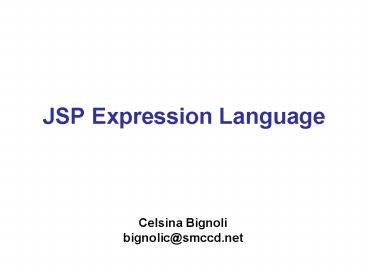JSP Expression Language - PowerPoint PPT Presentation
1 / 12
Title:
JSP Expression Language
Description:
Introduced as part of standard JSP in version 2.0. simple expression language for accessing variables. starts with the ${ delimiter and ends with } ... – PowerPoint PPT presentation
Number of Views:279
Avg rating:3.0/5.0
Title: JSP Expression Language
1
JSP Expression Language
Celsina Bignoli bignolic_at_smccd.net
2
Expression Language
- Introduced as part of standard JSP in version 2.0
- simple expression language for accessing
variables - starts with the delimiter and ends with
- anExpression
- Case sensitive. All keywords are lowercase
3
Using Expressions
- in static text
- The value of the expression is computed and
inserted into the current output - In any standard or custom tag attribute that can
accept an expression - ltsometag value"expr"/gt
- The expression is evaluated and the result is
coerced to the attribute's expected type - ltsometag value"someexprexprtextexpr"
/gt - The expressions are evaluated from left to right.
Each expression is coerced to a String and then
concatenated with any intervening text. The
resulting String is then coerced to the
attribute's expected type.
4
Variables
- The web container evaluates a variable that
appears in an expression by looking up its value
according to the behavior of PageContext.findAttri
bute(String). - For example, when evaluating the expression
product, the container will look for product
in the following scopes - page
- request
- session
- application
- If product is not found, null is returned.
5
Variables
- Properties of variables are accessed using the .
operator and can be nested arbitrarily - For example
- pageContext.session
- myBean.attribute1.attribute2
6
Implicit Variables
- pageContext The context for the JSP page.
Provides access to various other objects
including - session The session object for the client.
- request The request triggering the execution of
the JSP page. - response The response returned by the JSP page.
7
Implicit Variables
- param Maps a request parameter name to a single
value - ltcout valueparam.userName /gt
- paramValues Maps a request parameter name to an
array of values - header Maps a request header name to a single
value - headerValues Maps a request header name to an
array of values - cookie Maps a cookie name to a single cookie
- initParam Maps a context initialization
parameter name to a single value
8
Implicit Variables
- pageScope Maps page-scoped variable names to
their values - requestScope Maps request-scoped variable names
to their values - sessionScope Maps session-scoped variable names
to their values - applicationScope Maps application-scoped
variable names to their values
9
Literals
- The JSP expression language defines the following
literals - Boolean true and false
- Integer as in Java
- Floating point as in Java
- String with single and double quotes " is
escaped as \", ' is escaped as \', and \ is
escaped as \\. - Null null
10
Literals
- the JSP expression language provides the
following operators - Arithmetic , - (binary), , / and div, and
mod, - (unary) - Logical and, , or, , not, !
- Relational , eq, !, ne, lt, lt, gt, gt, lt, ge,
gt, le. Comparisons can be made against other
values, or against boolean, string, integer, or
floating point literals. - Empty The empty operator is a prefix operation
that can be used to determine whether a value is
null or empty. - Conditional A ? B C. Evaluate B or C,
depending on the result of the evaluation of A.
11
Reserved Words
- The following words are reserved for the JSP
expression language and should not be used as
identifiers - and eq gt true instanceof
or ne le false empty not lt ge null
div mod
12
Example
- 4.0 gt 3 true
- empty param.add true if parameter add in the
request is null or empty string - pageContext.request.contextPath The context
path - sessionScope.cart.numberOfItems The value of
the numberOfItems property of the session-scoped
attribute named cart































